Samsung Galaxy Tab Pro 8.4 and 10.1 Review
by Jarred Walton on March 22, 2014 9:30 PM ESTPerformance Benchmarks
In the world of laptops where I come from, we’re fast reaching the point – if not well beyond it – where talking about raw performance only matters to a small subset of users. Everything with Core i3 and above is generally “fast enough” that users don’t really notice or care. For tablets, the difference in speed between a budget and a premium device is far more dramatic. I’ve included numbers from the Dell Venue 8, which I’ll be providing a short review of in the near future. While the price isn’t bad, the two Samsung tablets feel substantially snappier – as they should. We’ll start with the CPU/system benchmarks and then move to the GPU/Graphics tests.
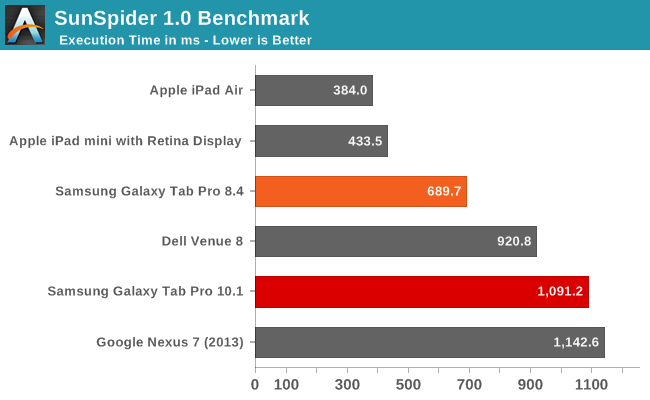
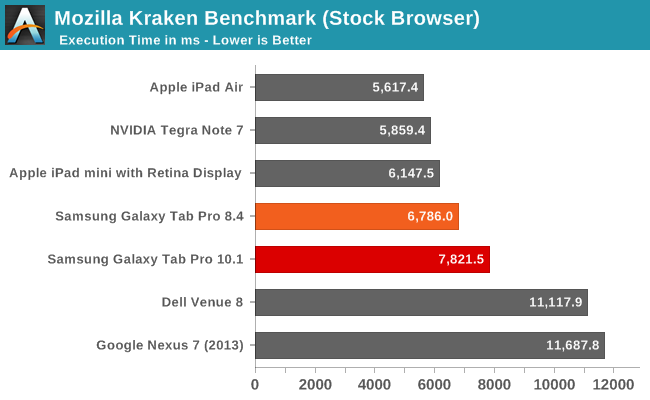
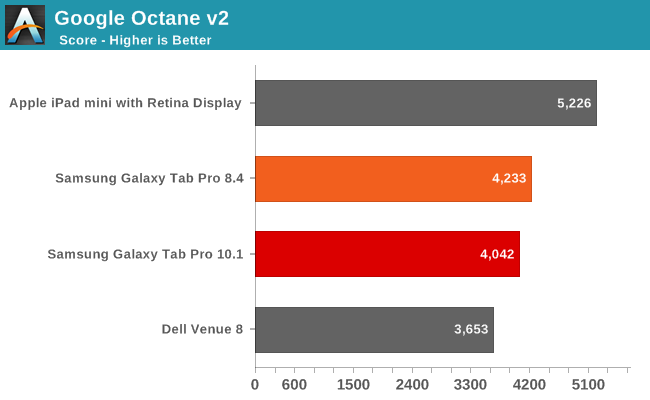
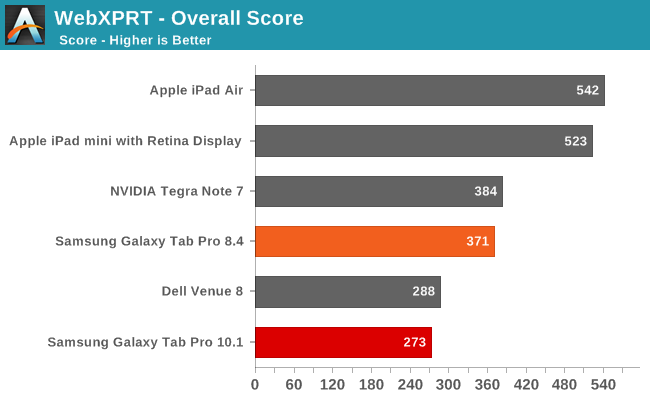
In terms of CPU speed, the Apple A7 chips still take the lead in all of our tests, though not always by a large margin. We’re also using different browsers (Chrome vs. Safari), and JavaScript benchmarks aren’t always the greatest way of comparing CPU performance. I ran additional benchmarks on the two Samsung tablets just to see if I could get some additional information; you can find a table of results for AndeBench, Basemark OS II, and Geekbench 3.
| CPU/System Benchmarks of Samsung Galaxy Tab Pro | |||
| Benchmark | Subtest | Tab Pro 10.1 | Tab Pro 8.4 |
| Andebench | Native | 13804 | 17533 |
| Java | 708 | 790 | |
| Basemark OS II | Overall | 865 | 1062 |
| System | 1542 | 1529 | |
| Memory | 419 | 503 | |
| Graphics | 1032 | 2555 | |
| Web | 838 | 724 | |
| Geekbench 3 | Single | 942 | 910 |
| Multi | 2692 | 2847 | |
| Integer Single | 1028 | 967 | |
| Integer Multi | 3135 | 3343 | |
| FP Single | 897 | 848 | |
| FP Multi | 3106 | 3080 | |
| Memory Single | 860 | 922 | |
| Memory Multi | 982 | 1391 | |
Interestingly, the Samsung Exynos 5 Octa 5420 just seems to come up short versus the Snapdragon 800 in most of these tests. However, there’s a bit more going on than you might expect. We checked for cheating in the benchmarks, and found no evidence that either of these tablets was doing anything unusual in terms of boosting clock speeds. What we did find is that the Pro 10.1 is frequently not running at maximum frequency – or anywhere near it – in quite a few of our CPU tests.
Specifically, Sunspider, Kraken, and Andebench had the cores hitting a maximum 1.1-1.3GHz. The Pro 8.4 meanwhile would typically hit the maximum 2.3GHz clock speed. The result, as you might imagine, is that the 8.4 ends up being faster, sometimes by a sizeable margin. Basemark OS II, Geekbench 3, and AnTuTu on the other hand didn’t have any such odd behavior, with the Pro 10.1 often hitting 1.8-1.9GHz (on one or more cores) during the testing, and when that happens it often ends up slightly faster than the Pro 8.4.
Which benchmark results are more "valid"? Well, that's a different subject, but as we're comparing Samsung tablets running more or less the same build of Android, we can reasonably compare the two and say that the 8.4 has better overall performance. Updated drivers or tweaking of the power governor on the 10.1 might change things down the road, but we can only test what exists right now.
Overall, both systems are sufficiently fast for a modern premium tablet, so I wouldn’t worry too much about whether or not you’re getting maximum clock speeds in a few benchmarks – in normal use you likely won’t notice one way or the other. But we’re only talking about the CPU performance when we say you won’t see the difference; let’s move over to the graphics benchmarks to see how the Galaxy Pro tablets fare.
Graphics Performance
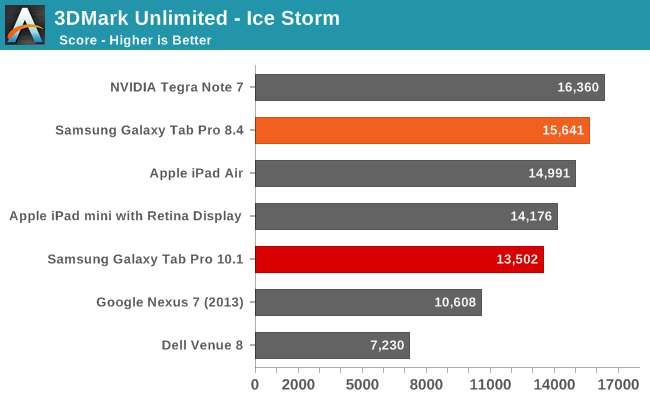
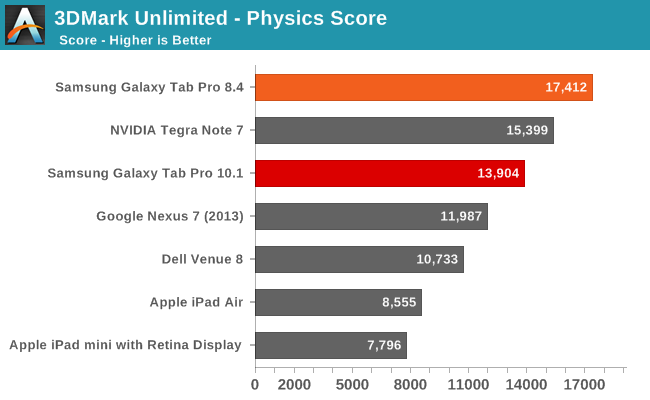
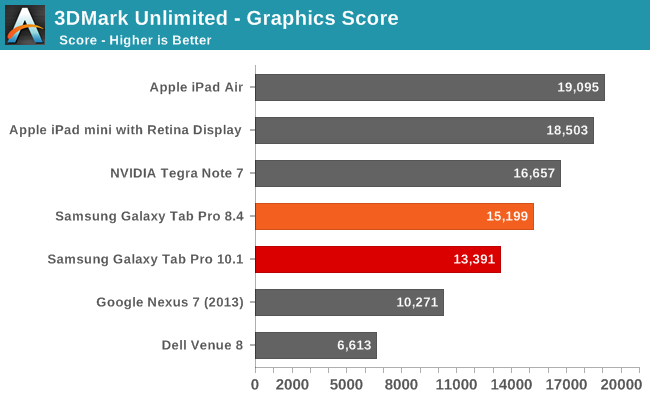
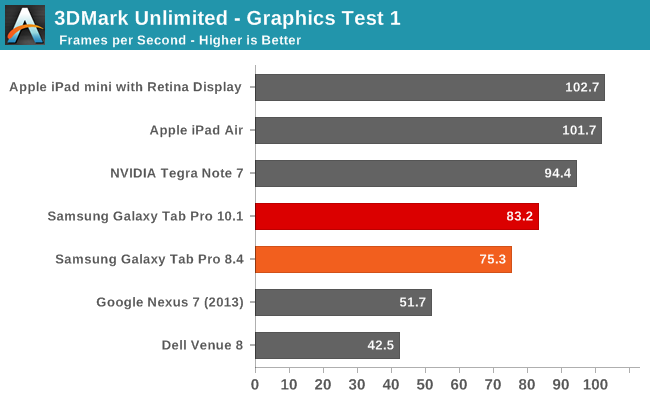
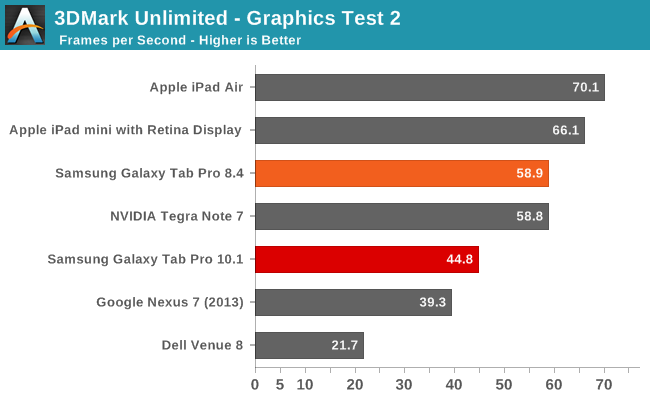
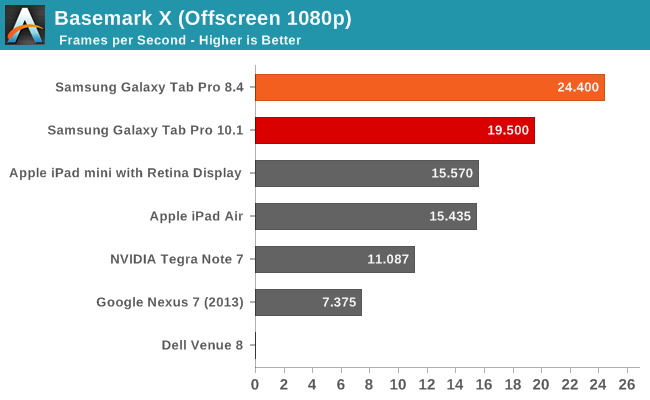
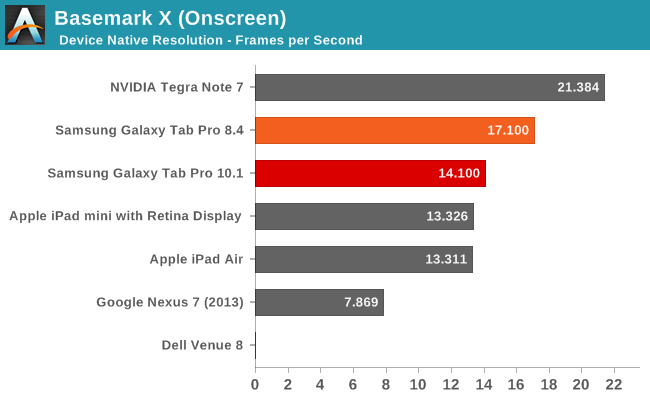
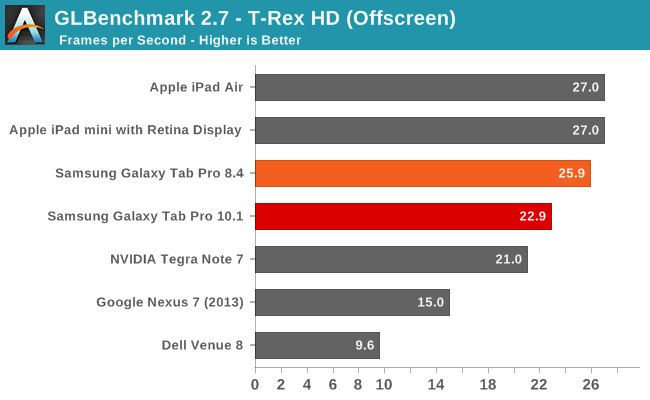
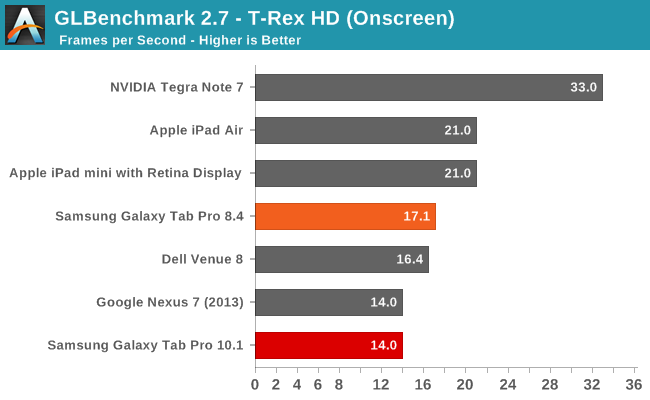
Outside of the 3DMark Unlimited Graphics Test 1 result, the Pro 8.4 sweeps the tables against its big brother. Playing games like Angry Birds Go! or any other reasonably demanding 3D titles in my experience confirms the above results – Adreno 330 beats the Mali-T628; end of discussion. I also had a few quirks crop up with the Pro 10.1 graphics, like Plants vs. Zombies 2 at one point stopped rendering all the fonts properly; a reboot fixed the problem, but I may have seen one or two other rendering glitches during testing. I have some additional results for GPU testing as well via GFXBench 3.0 if you’re interested:
| Graphics Benchmarks of Samsung Galaxy Tab Pro | |||
| Benchmark | Subtest | Tab Pro 10.1 | Tab Pro 8.4 |
| GFXBench 3.0 Onscreen | Manhattan (FPS) | 2.9 | 5.8 |
| T-Rex (FPS) | 14 | 17.1 | |
| ALU (FPS) | 13 | 59.8 | |
| Alpha Blending (MB/s) | 3295 | 6847 | |
| Fill (MTex/s) | 1956 | 3926 | |
| GFXBench 3.0 Offscreen | Manhattan (FPS) | 5.5 | 10.8 |
| T-Rex (FPS) | 22.9 | 25.9 | |
| ALU (FPS) | 25.6 | 138 | |
| Alpha Blending (MB/s) | 3093 | 7263 | |
| Fill (MTex/s) | 1956 | 3780 | |
The new Manhattan benchmark was one of the other tests where the Pro 10.1 didn’t seem to render things properly, and even then the Pro 8.4 ends up with nearly twice the frame rates. The ALU, Alpha Blending, and Fill rate scores might explain some of what’s going on, where in some cases the Pro 8.4 is more than four times as fast. Regardless, if you want maximum frame rates, I’d suggest getting the Pro 8.4 over the 10.1.










125 Comments
View All Comments
akdj - Monday, March 24, 2014 - link
You DO realize Window's Surface/Yog/da/HP 2 in 1, et al run on the third or fourth core 'i' chips right? And these tabs....Sammy, Apple, LG, etc are run on ARM SoCs correct? Huge discrepancy in performance measurement. Should be assumed as they've run BayTrail scores in interviews, conducted the 'Surface' interviews...and a quick peak in 'search' you'll be able to derive the performance differences yourself. They're not competitors right now. Intel is many times more powerful as are their iGPUs being used in the laptop form factor. Weight is a big differentiator as well. A pound or three? Keyboard (physical) or not? You get the idea. While the walls are closing in, totally different architecturesakdj - Monday, March 24, 2014 - link
Reviews. Not 'interviews'. Love spell check. And 'edit' ;)az_ - Monday, March 24, 2014 - link
Yes, I know they are different architectures but they serve the same purpose. They all have touch screens, web browsers and run applications and games. It would be interesting to see how they compare, even if it is in just a few of the benchmarks that can be run on all of the devices. Size, weight and battery life differ but I might be willing to sacrifice some portability for a couple of times more performance. And bay trail tablets should be pretty similar in performance, size/weight and battery life to arm ones.I can probably dig through different reviews and compare numbers but that is too much work, it is much better to just include them in the charts.
Golgatha - Monday, March 24, 2014 - link
You would think for a price range of $399-$849 they could include more than 16/32GB of storage on these things.RobertMontreal - Monday, March 24, 2014 - link
Will not load Words with Friends on Pro 10.1. I spent 15 minutes with two people on this and the problem could not be resolved. I found a review (5 stars on 5 stars) on the pre-Pro version that laments the same problem.hockey - Monday, March 24, 2014 - link
The Samsung Galaxy Tab is one of the most talked about new tablet devices to hit the market. With more and more companies joining the gold rush following the release of the iPad, Samsung has included many features which makes it stand out from the rest.juhatus - Tuesday, March 25, 2014 - link
If your not tied to a ecosystem, the director competitor is iPad mini2, which is cheaper and better built quality. I'm trying to choose between the two.. almost wanting to try android for a change. Maybe the droid is more educational for the son. Great article I would missed the Samsung tab all together.ESC2000 - Wednesday, March 26, 2014 - link
How is the iPad mini with retina cheaper? It also costs $400. I assume you're not referring to the first gen mini which was a mediocre tablet made out of 2010 parts.Rdmkr - Wednesday, March 26, 2014 - link
Isn't the solution to the whole "what does and doesn't constitute cheating" dilemma to always measure power consumption alongside performance so that whenever an OEM "cheats" by boosting the clock speed, they just shoot themselves in the foot by making the power consumption number look correspondingly worse.Death666Angel - Wednesday, March 26, 2014 - link
Having finished the review just now, wanted to say that I really liked your style. It's refreshing to see such a subjective take of tablets on Anandtech. And you are mentioning the right "it's personal preference" things which sometimes I think get lost here. Looking forward to more tablet reviews by you! :-)